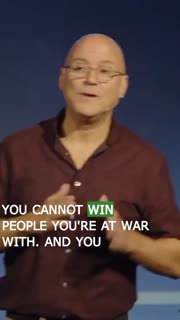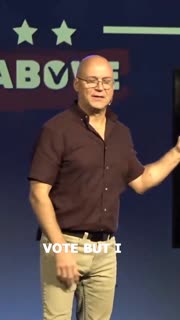Faithful Engagement: Navigating Politics with Jesus' Teachings
Devotional
Sermon Summary
Sermon Clips
1) "The way we conduct ourselves and the conversations that we have around politics and the issues plaguing our country, right, facing our country, it reveals, those things reveal a lot about where our confidence, truly lies. And I think this is the most important election of our lifetime because I hear way too many followers of Jesus putting all of their eggs in the basket of a candidate who at best is going to maybe have four years, eight years, and we'll move on. And so I think there's a lot more at stake here because the way we conduct ourselves, the way we think about this, the way we talk to other people about this reveals where our confidence is. It reveals where our confidence really lies. It reveals what our real purpose is." [33:50] (52 seconds)
2) "Listen, you've spent more time reading people's platform than you have God's Word. You spend more time dialoguing about that, and you're trying to do more to campaign to get people into your party, whichever party it is, than you are about getting somebody to church or to follow Jesus or anything else. And so something has shifted, and it shows up in your heart. If you say, well, that's not me. Listen, let me just tell you the symptoms of the election infection, okay? Here are the symptoms. Deep fear about the outcome. Anxiety. I'm not able to really sleep, not to be able to calm, not to be able to focus, having to check the phone for the latest updates, for the little things, whatever it may be, right? Contempt. One of the symptoms is contempt for anybody on the other side of the issue, whatever it is. Like contempt, you know, disdain. Disgrace. Disgust, right?" [36:37] (47 seconds)
3) "You see, Jesus gave us a better way to be politically engaged by pursuing people rather than positions of power. And the purpose for which he, he called people to follow him. It's people. He said, if you follow me, I'll make you fishers of men, not people in office. Right? And we're willing to compromise or to jeopardize and even just kind of get rid of that purpose for this other purpose. And it's if you don't support who I support, unfriend me now." [38:46] (36 seconds)
4) "Jesus gives us a better way. And here's the thing. When he comes onto the scene, Jesus didn't choose a side or compromise. But he offered an entirely different alternative. It was called the way. Now, he didn't call it that. People around him started calling it that. And then actually whenever he ascended back to the Father after death and resurrection and ascension. When his followers continued to kind of perpetuate his message and continue operating the way that he operated. They started calling those people the people of the way." [46:07] (36 seconds)
5) "You cannot win people you're at war with. And you cannot win people when all you're doing is trying to blame them for all the problems in the world. They may be responsible for all the problems in the world. But you don't win. You don't win people. You don't win people into the party of Jesus or to Jesus when you're constantly communicating that you're at war with them." [59:28] (24 seconds)
6) "Our platform is that we are to be in the world not of it. In other words the platform is engage. And participate. But don't emulate. And see that's the problem when I look at how a lot of churches are handling this. A lot of pastors are handling this. And why it's so different over the last decade. Is because we're doing it just like they do it. We've gotten engaged and participate in the political process that we can't tell the difference between a campaign rally and a church service. And we're emulating it. And he says don't do that." [01:08:25] (40 seconds)
7) "I want you to vote but I don't want you to put your hope in the person or party you vote for I don't because here's the thing some people have been saying well there's only one candidate on that issue and that's the only one that and you come to find out they're not even that firm on that issue and they're not even that committed to that issue they're just saying what they need to get your vote so I want you to vote but I don't want you to put your hope in the person of the party that you vote for we say well then why would we vote here's why we vote because God works through people he most often works through people and he's always given an invitation to participate in his redemptive activity and we should all be working to create a culture and a society that is best for all people that will give them a glimpse of thy kingdom come and all that and so therefore we do vote and we do take the opportunity to create culture and shape culture and do all that we can to influence the culture towards the kingdom of heaven a lot of people don't have that opportunity I want you to vote I just don't want you to put your hope and all your eggs in the basket of the people of the party you put your hope in because come on if there's anything I've learned in the short life I've lived they all let us down and all of them have limited power it can only do so much" [01:20:38] (82 seconds)
Ask a question about this sermon
2) "Listen, you've spent more time reading people's platform than you have God's Word. You spend more time dialoguing about that, and you're trying to do more to campaign to get people into your party, whichever party it is, than you are about getting somebody to church or to follow Jesus or anything else. And so something has shifted, and it shows up in your heart. If you say, well, that's not me. Listen, let me just tell you the symptoms of the election infection, okay? Here are the symptoms. Deep fear about the outcome. Anxiety. I'm not able to really sleep, not to be able to calm, not to be able to focus, having to check the phone for the latest updates, for the little things, whatever it may be, right? Contempt. One of the symptoms is contempt for anybody on the other side of the issue, whatever it is. Like contempt, you know, disdain. Disgrace. Disgust, right?" [36:37] (47 seconds)
3) "You see, Jesus gave us a better way to be politically engaged by pursuing people rather than positions of power. And the purpose for which he, he called people to follow him. It's people. He said, if you follow me, I'll make you fishers of men, not people in office. Right? And we're willing to compromise or to jeopardize and even just kind of get rid of that purpose for this other purpose. And it's if you don't support who I support, unfriend me now." [38:46] (36 seconds)
4) "Jesus gives us a better way. And here's the thing. When he comes onto the scene, Jesus didn't choose a side or compromise. But he offered an entirely different alternative. It was called the way. Now, he didn't call it that. People around him started calling it that. And then actually whenever he ascended back to the Father after death and resurrection and ascension. When his followers continued to kind of perpetuate his message and continue operating the way that he operated. They started calling those people the people of the way." [46:07] (36 seconds)
5) "You cannot win people you're at war with. And you cannot win people when all you're doing is trying to blame them for all the problems in the world. They may be responsible for all the problems in the world. But you don't win. You don't win people. You don't win people into the party of Jesus or to Jesus when you're constantly communicating that you're at war with them." [59:28] (24 seconds)
6) "Our platform is that we are to be in the world not of it. In other words the platform is engage. And participate. But don't emulate. And see that's the problem when I look at how a lot of churches are handling this. A lot of pastors are handling this. And why it's so different over the last decade. Is because we're doing it just like they do it. We've gotten engaged and participate in the political process that we can't tell the difference between a campaign rally and a church service. And we're emulating it. And he says don't do that." [01:08:25] (40 seconds)
7) "I want you to vote but I don't want you to put your hope in the person or party you vote for I don't because here's the thing some people have been saying well there's only one candidate on that issue and that's the only one that and you come to find out they're not even that firm on that issue and they're not even that committed to that issue they're just saying what they need to get your vote so I want you to vote but I don't want you to put your hope in the person of the party that you vote for we say well then why would we vote here's why we vote because God works through people he most often works through people and he's always given an invitation to participate in his redemptive activity and we should all be working to create a culture and a society that is best for all people that will give them a glimpse of thy kingdom come and all that and so therefore we do vote and we do take the opportunity to create culture and shape culture and do all that we can to influence the culture towards the kingdom of heaven a lot of people don't have that opportunity I want you to vote I just don't want you to put your hope and all your eggs in the basket of the people of the party you put your hope in because come on if there's anything I've learned in the short life I've lived they all let us down and all of them have limited power it can only do so much" [01:20:38] (82 seconds)







